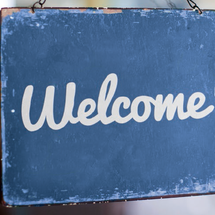
People across the country have been getting in touch with us to ask how they can help refugees feel part of their community.
Elaine Connelly, Interim Communities Manager at Scottish Refugee Council and Ahlam Souidi Chair of the community group Uniting Nations in Scotland, give some suggestions on how you can welcome refugees.
A warm welcome
Refugees are ordinary people, just like us, who have found themselves in extraordinary circumstances. The people who are being resettled here in Scotland include women and children at risk, survivors of torture and violence, and people with medical needs.
Settling in a new country and rebuilding their lives will take time so patience and understanding are really important.
Small everyday things can mean a lot – talk to someone at the school gate, in the shops or at the bus stop, even just a few words or a smile in the street can make a difference.
If you are part of a local welcome group, or are thinking of setting one up with friends and neighbours, it’s a good idea to develop a relationship with your local council so that you can work together to welcome and support refugees. Ask your local council if they have a community worker who can help you to develop your group and to engage with refugee communities in your local area. Consider whether there are other groups and/or people within your community who can help, or have skills and knowledge which can contribute to your group.
Getting to know each other
Some welcome groups have set up drop-ins (places where people can meet informally) or simple activities, for instance sewing or arts groups. These types of activities are great because they can help overcome language barriers. Although some refugees will be able to speak English, many won’t, although from our experience most are extremely keen to learn and are always looking for informal opportunities for practice. You could also learn a few words, like hello and thank you, in their language.
If you are arranging activities or meetings, consider what might stop people from taking part. Think carefully about where you have the meeting: is it easy to find? Is it safe? Is it welcoming?
Also, consider timing of meetings, as some people might not want to go out at night and others may have to drop off and collect from children from school at certain times. It’s also worth thinking about how to avoid or limit people’s travel costs or childcare costs. What about language barriers? You might need to arrange an interpreter but perhaps there is someone within the refugee community or within the wider community who could help with this. It is only by getting to know people that you will find out what suits best so don’t be afraid to try things out and to learn from what works and what doesn’t work quite so well.
Listen to each other. Get to know new refugees in your community and understand their needs and their strengths, as this will help you to plan what your group can best do to support them. Yes, refugees have come from difficult situations and may need support, but they also bring their own skills, knowledge, talents, and experience.
Involving people
Involve new community members in what you are doing, particularly in the longer term as people become more settled. For instance, if you have set up a group to welcome refugees, why not ask refugees to become involved or if you are setting up an event, why not invite some refugees to become part of the planning group?
Your wider community
Inform your group about refugees and the reasons that force people to flee their country. Consider ways in which you can raise awareness within your community – give a talk, learn how to cook a dish, sign a petition, get involved in campaigning.
Look at creating opportunities for people from different communities to meet, formally or informally. It’s amazing what can happen when different communities get to know each other and see what they have in common with each other. Refugees face many of the same issues as others living in the community, such as problems with housing, employment, worries about children, money etc.
Focus on building connections and things that you can do together. For example, you could think about organising a community event to bring everyone together to share cultures and learn about each other. Everyone loves music, food and dancing!
Becoming part of a new community takes time and effort from everyone – it’s not easy and it won’t always be a smooth journey. It takes time to build up trust and meaningful relationships. Be prepared to learn from each other and to do things differently if necessary. Refugees want to rebuild their lives here in Scotland and local communities are vital to helping make that happen. By working together, we can all play a part in ensuring that Scotland is a welcoming, diverse and positive place to live.
Scottish Refugee Council will be delivering workshops and training for welcoming groups in the near future – details will be posted on our website.
Refugee Festival Scotland is also a good opportunity to learn more and engage with refugee communities in Scotland.
